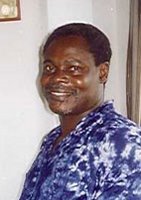African countries are grappling to undo a legacy dominated by trade with their former colonial rulers rather than with each other. Senegal's biggest trading partner is France, while Gambia trades extensively with the UK. Although Senegal surrounds Gambia, trade between the two neighbours is minimal...A major critique of current regional integration efforts in Africa is that their design and objectives are driven by a preference for formal rather than informal trade. Ms. Mkhonza (Former assistant secretary-general,ACP ) views the sector as an effective means of integration from below, as small-scale trade is often conducted and driven by the needs of indigenous traders rather than governments or international agencies."There is a real economic integration going on at the informal level," concurs the non-governmental InterAfrica Group (IAG). For many years it has been recognized that many countries' real economies "have been mostly informal and much larger, more dynamic and more regionally integrated than their official economies."
Boosting Regional Trade and the Informal Sector
Investing in emerging markets
Chamberlain S. Peterside writes
At the end of the day it’s a question of making strategic cost-benefit analysis that stretches beyond your comfort zone. For one, companies/entrepreneurs must constantly strive to uncover new grounds rather than rest on their laurels or else they will soon become extinct. For companies looking to scale higher altitudes in sectors like natural resources, technology outsourcing, telecommunication, low-cost manufacturing, consumer goods/services retailing, infrastructure development and the like, some of the emerging countries present stupendous growth prospects that are impossible to ignore, as reflected in the colossal volume of potential consumers and resources – China is estimated to have more mobile phone users than the whole of US population, India’s middle class is almost equivalent to the total population of Western European, while phone subscription in Nigeria grew from less than 700,000 to over 25 million within 5 years (2001-2006), according to published data.
Competing in China
There is be a lesson to be learned from the reported successes of SA firms in China:
Companies with roots in South Africa, the largest and most sophisticated economy on the continent, have eagerly expanded beyond national borders since the end of apartheid-era sanctions in 1994. Few of these new markets have proved as lucrative as China, where lessons learned in poor, complex African markets have given the companies an edge against U.S. and European competitors, South African business executives say.Contrast this with the ceaseless hand-wringing of many regarding the 'insurmountable' Chinese. Budding SSA multinationals should look to emulate the achievements of their SA counterparts.
via Washington Post
The Ten-Cent Solution

 "Cheap private schools are educating poor children across the developing world—but without much encouragement from the international aid establishment."
"Cheap private schools are educating poor children across the developing world—but without much encouragement from the international aid establishment."
Clive Crook in The Atlantic writes about the research and experiences of James Tooley covered earlier.He poses the question, why have we not heard about this idea? :
This is not because his work is dull or unimportant. His findings are surprising, and they bear directly and profoundly on the relief of extreme poverty all over the world. (Name me a more important issue than that.) The reason you haven’t heard of James Tooley is that his work is something of an embarrassment to the official aid and development industry. He has demonstrated something that many development professionals would rather not know—and would prefer that you not know, either...On the whole, dime-a-day for-profit schools are doing a better job of teaching the poorest children than the far more expensive state schools. In many localities, private schools operate alongside a free, government-run alternative. Many parents, poor as they may be, have chosen to reject it and to pay perhaps a tenth of their meager incomes to educate their children privately. They would hardly do that unless they expected better results.
Better results are what they get. After comparing test scores for literacy and basic math, Tooley has shown that pupils in private schools do better than their state-school equivalents—at between a half and a quarter of the per-pupil teacher cost. In some places, such as Gansu, China, the researchers found that private schools serving the poor had worse facilities than comparable state schools; in Hyderabad, they were better equipped (with blackboards, desks, toilets, drinking water, and so on). Regardless, the tests so far show that private-school students do better across the board.
via NextBillion
University-Industry Links
Glenda Kruss writes about University-Industry linkages and the South African experience:
Establishing effective cross-sector networks rather than limited contracts and consultancies can reconcile these two positions. Africa needs partnerships that both harness the innovation potential of university research and meet industrial needs for development. South Africa's best examples can lead the way...To create such partnerships, institutions first need to understand the competitive dynamics of their target industry, and what individual firms in their region could use. And they need to be realistic to avoid ambitious science parks or design centres failing.
Universities must build their general research capacity, and specific expertise in niche areas (most of South Africa's best networks are in just a few well-established universities that have well-organised research systems). Then, they need to develop research policies and mechanisms to specifically support partnerships. They must decide which partnerships will best promote their academic mission and serve their financial imperatives, as well as contributing to national development goals.
via SciDev
Africa Must Fix Itself:China and the West Won't Do It
 Andrew Mwenda writes in the WashingtonPost:
Andrew Mwenda writes in the WashingtonPost:
More aid to Africa, whether it comes from the West or China, should not give us too much hope because, at root, foreign aid is an ineffective instrument that distorts recipients' incentives for the worse. Aid is given with the assumption that its recipients lack the necessary resource base to generate tax revenue to meet their public expenditure needs. Yet in many African countries, the problem of insufficient tax revenue is caused by poor tax administration, bad policies, and institutions that undermine growth. Then, once taxes come in, there is poor prioritization of expenditures.
via AfricaWorks
Another Africa is Possible!
George Nyongesa writes in The African Executive:Time is ripe for us to consider a “do it ourselves philosophy” or some form of self help program that focuses on our largest resource: the ordinary people, most often called poor people. This group has been the target of poverty reduction efforts and has been viewed as problems. This mindset has led to disenfranchising the poor from the development process. It is unwise to presume that the poor, be they illiterate, are bereft of inherent skills, experiences and talents that can be useful in building our communities. The same people are our heroes who daily create better livelihoods for their children. They fought colonialism and resisted slavery. How can we suddenly ignore them in our new struggles? These are the days of building economies based on people; not on gold, diamond or oil. The world today revolves on the axis of mind economy. African governments should develop confidence in the ordinary people, quit business, and maximize their citizens’ free enterprise.
Education Pyramids
School is seen as an escape route from the village; a magic elevator that will lift your child from the patch of subsistence land and transport him or her to the city to work in an office and send money back to the family. It is a terrible illusion. Visit a typical village school and you will find rows of old-fashioned desks crammed with anxious young people chanting answers learned by heart. The curriculum that is being crammed belongs to Britain in 1960...The education system in most African countries is a steepening pyramid pointed at Oxbridge and creating failure and despair at every level. Each year millions tumble off it, without qualifications or useful knowledge. They are failures who have wasted the family's resources, but they cannot go back to digging the land, because they have "learned book." Despite the obvious need for profound curriculum reform, African civil servants and politicians have little interest, since they themselves reached the peak of the pyramid. But what about the rejects?
An answer comes in the form of Ashoka Fellow Mwalimu Musheshe founder of Uganda Rural Development and Training Programme (URDT)whose school:
teaches you how to make life better here in this area when you leave school." The next thing he tells parents is that they too must come to school and learn alongside their children. And it is not just literacy that the school teaches. There is a solar power centre and, if families can afford a car battery, they can charge it up for 60p, which will give them a light in their house for a month. In a country with 12-hour nights, that is a lot of studying time. The schoolchildren learn to grow their own food and use new farming methods. They look after the school herd of cows, using the cowshit in a biogas maker for cooking.
via Prospect Magazine
B-Schools Put Africa on the Curriculum
Businessweek reports:
Africa is top-of-mind on B-school campuses, too. Schools such as Columbia, Yale, and Dartmouth's Tuck are sending their students to places like Tanzania and South Africa. Meanwhile, B-schools are tweaking their curricula to include Africa-centric case studies. As far as many MBAs are concerned, there's no better emerging economy to explore"There's a huge area of land with a lot to offer in terms of human resources," says Shamik Narotam, a second-year finance student at the London Business School who studied in Cape Town this fall. "You can't ignore it anymore."
Kenyan Stock Market
The Guardian reports on the Kenyan Stock Market:
Kenya has gone share crazy. The incredible performance of the Nairobi Stock Exchange (NSE) - which is next to the public auditorium and provides the live share-price feed - is the talk of the country. From 2002 to 2007, the main NSE index rose 787% in dollar terms, according to Standard & Poor's, the investment research firm, making it one of the world's best-performing markets.
via Investing in Africa
Neglected Local Science
 The Economist reports:
The Economist reports:
African scientists feel neglected by their politicians who, they suspect, do not understand that geeks as well as businessmen are crucial to economic development...It is, of course, possible to free-ride on the science and technology of others. But in Africa, as elsewhere, no one knows better than the locals exactly what technology needs to be created, and no one has a greater incentive to create it. Nor need such technology be of the unsophisticated kind often badged as “appropriate” by well-meaning outsiders. Appropriate technology can be very sophisticated indeed.photo courtesy of the Economist
MFIs and the Remittances Business
A recent publication of the Foundation for Development Cooperation states:
Migrant workers and their families need financial products which make it easier to send, receive and manage international money transfers, and to save and invest their income. Microfinance is well-suited for remittance-linked financial services, particularly among poor and geographically isolated populations. Because they are poor, many remittance recipients fall outside typical bank client profiles, but are well within the market segment targeted by microfinance agencies. By extending remittance-linked services to the ‘unbanked’, microfinance has the potential to promote broad-based development while vastly expanding the volume of remittance flows mediated through financial institutions.via NextBillion






